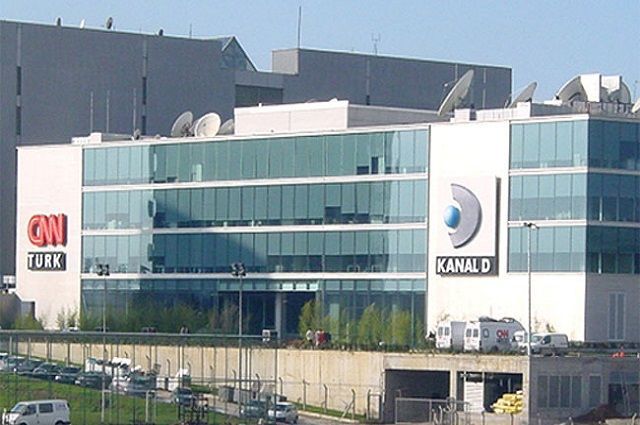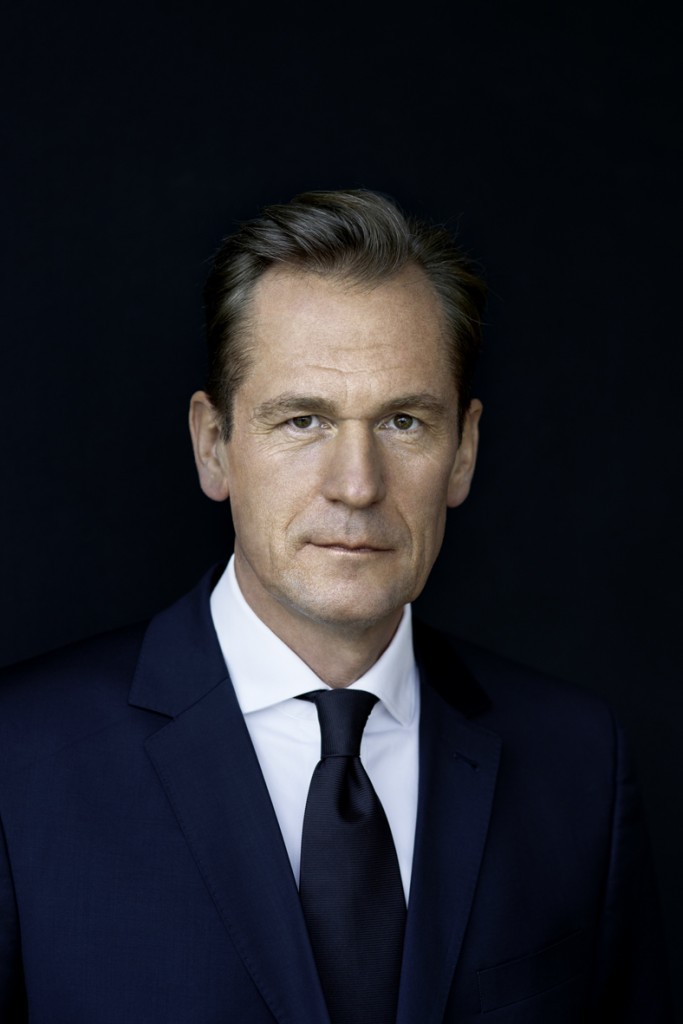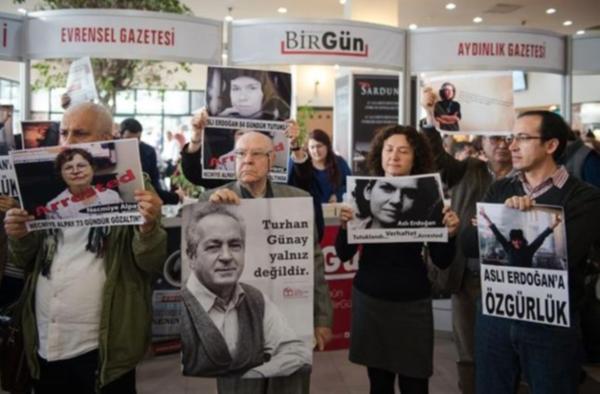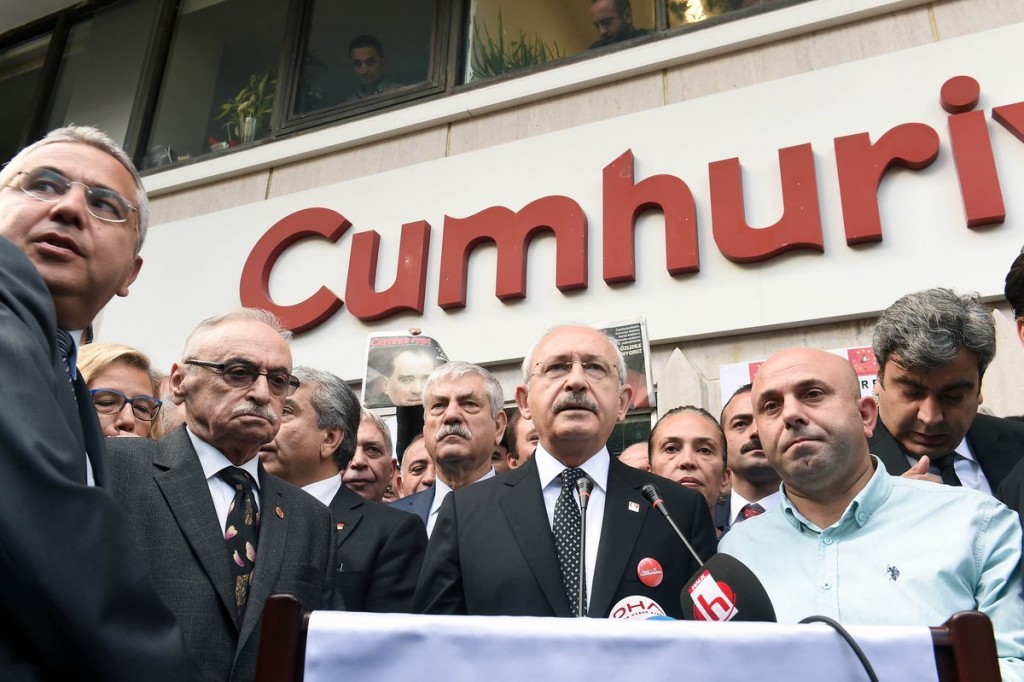Despite local and international concerns, the Turkish authorities continue to clampdown on opposition media. In the past fortnight, the police have arrested and charged the editor and journalists of respected broadsheet Cumhuriyet claiming they were linked with “terrorists”. It was the final straw for one major foreign media investor in the country.
On Nov. 3, Germany’s Axel Springer SE – one of Europe’s largest publishers – announced it was going to sell its remaining 7% stake in Doğan TV. CEO Mathias Doepfner claimed “press freedom is being trampled upon” in Turkey.
The news first appeared on Bloomberg. According to their report, Doepfner told reporters that, “The developments in Turkey are very worrisome.” It has prompted the Berlin-based media giant to stop further investments in the country.
In January, Axel Springer sold 2.3 percent in Doğan TV for €55.3 million. It now intends to exercise its options to sell its remaining stake for about €170 million in the next few years.
Doğan TV is one of Turkey’s largest media and entertainment groups. It owns the country’s second biggest digital platform D-SMART, as well as various TV channels including Kanal D, CNNTÜRK, and TV2. Its portfolio also extends to two production companies, D Prodüksiyon and InDHouse, various national radio stations, and record label DMC.

Its partnership with Axel Springer dates back to 2009, when the Germans bought a 29% stake in the company. Then called Doğan Media, it also housed newspapers, including Turkey’s biggest selling newspaper Hürriyet, and other popular dailies Radikal and Milliyet. After a spat with the Turkish government over tax, Doğan Media sold off some of its popular titles and TV channels, and its broadcasting and entertainment division was subsequently absorbed into parent company Doğan Holding in 2014.
“Turkey is at risk of losing more than independent reporting”
The news of Axel Springer pulling out will no doubt be a blow to more than the shareholders of Doğan Holding, which is listed on the Istanbul Stock Exchange.

In the same Bloomberg report, reporter Stefan Nicola wrote, “Doepfner’s comments show that Turkey is at risk of losing more than independent reporting. Western companies are wary of investing in a country where the government is cracking down on the opposition at a time when growth was already slowing and the currency was weakening. President Recep Tayyip Erdogan’s response to the crisis threatens to further complicate Turkey’s already embattled efforts to join the EU, a major attraction to Western companies like Axel Springer, one of Europe’s biggest publishers.”
The developments were not lost on Turkey Deputy Prime Minister Mehmet Şimşek, who told a closed meeting of business people on 10 Nov. that it was vital for the country to maintain its links with the EU and uphold democracy. Its failure to do this would mean it would be regarded as a “third-world country”, adversely impacting its ability to attract external investors.
Erdoğan’s efforts to sue German media giant’s CEO backfires
Axel Springer is one of Europe’s media power-house, whose multi-media brands include Bild, Die Welt and Business Insider. Earlier this year, the company was involved in a legal battle with the Turkish President after Doepfner publicly extended support for comedian Jan Boehmermann who was being sued after he recited an offensive poem about Recep Tayyip Erdoğan on German TV.
In addition to his case against Boehmermann, Erdoğan also sought an injunction against Doepfner. However, the German courts threw out the Doepfner case, stating, “In the conflict between freedom of speech and personal rights of the plaintiff, Doepfner’s statement is allowed because it’s a contribution to a public discourse in a controversial debate.”
Axel Springer’s growing unease over the Turkish authorities’ behaviour was come about not only because of their willingness to prosecute individuals who had ‘insulted’ President Erdoğan, which at one point stood at over 2,000 cases, but also their seizure of media critical of Erdoğan and the AKP government. Events reached a critical juncture this autumn as dozens more outlets were closed.
Turkey ranked 151st on world press freedom list
Turkey has been under a state of emergency following the failed coup on 15 July. Using its extended powers, the government has fired, suspended or arrested over 110,000 civil servants. According to the Turkish press association, it has also closed over 170 media organisations, including 16 television broadcasters and 45 newspapers, since the coup attempt, each time citing “terrorism”, although not a single case has been brought to trial.

The mass detention of journalists and the closure of so many media outlets have again seen Turkey plummet down the press freedom lists. It currently ranks 151st in a list of 180 countries on the Reporters Without Borders Press Freedom Index, wedged between Tajikistan (150) and Democratic Republic of Congo (152), and three places behind Russia, which is listed at 148.
The latest round of media detentions involved the senior editorial and management staff at Cumhuriyet, which made international headlines.
Daily vigil in support of Cumhuriyet
On 31 Oct. police raided the homes of 11 staff from Cumhuriyet on suspicion of “terrorist activities”. Two were subsequently released on police bail with the remaining nine charged on 5 Nov.
Those arrested were Murat Sabuncu, Cumhuriyet’s editor-in-chief, columnist Kadri Gürsel, caricaturist Musa Kart, and Cumhuriyet’s board members Güray Öz, Mustafa Kemal Güngör, Turhan Günay, Hakan Kara, Önder Çelik and Bülent Utku. The newspaper’s chairman Akın Atalay was also arrested as soon as he disembarked from a plane that landed in Istanbul following a business trip to Germany.
Among the evidence used in court to charge Cumhuriyet staff were the newspaper’s front pages and news stories. Prosecutors claim these demonstrated Cumhuriyet “committing crimes on behalf of the Fethullahist Terror Organization (FETÖ) and the outlawed Kurdistan Workers’ Party (PKK).”
The paper’s chairman and staff all vehemently reject the charges against them.
Cumhuriyet was established back in 1924 by journalist Yunus Nadi Abalıoğlu – a close friend of Mustafa Kemal Atatürk. The paper is known for its secular, centre-left stance and quality, high-brow reporting. Many of the country’s leading journalists first cut their teeth in journalism at the daily.
News of the raids and arrests has been met with anger and dismay across the country. Members of opposition party CHP and celebrities, including Onur Akın, Sevinç Eratalay and rock band Duman’s lead singer Kaan Tangöze, have joined members of the public in a daily vigil outside the paper’s offices in Istanbul.
And in a spirit of defiance, the newspaper has continued to publish, even though some of its most senior members are currently being held in custody. The day after the arrests, Cumhuriyet’s headline was “We will not surrender” (‘Teslim Olmayız’).
Main photo: CHP leader Kemal Kılıçdaroğlu lends his support to Cumhuriyet newspaper, 10 Nov. 2016. Photo: CHP Twitter





